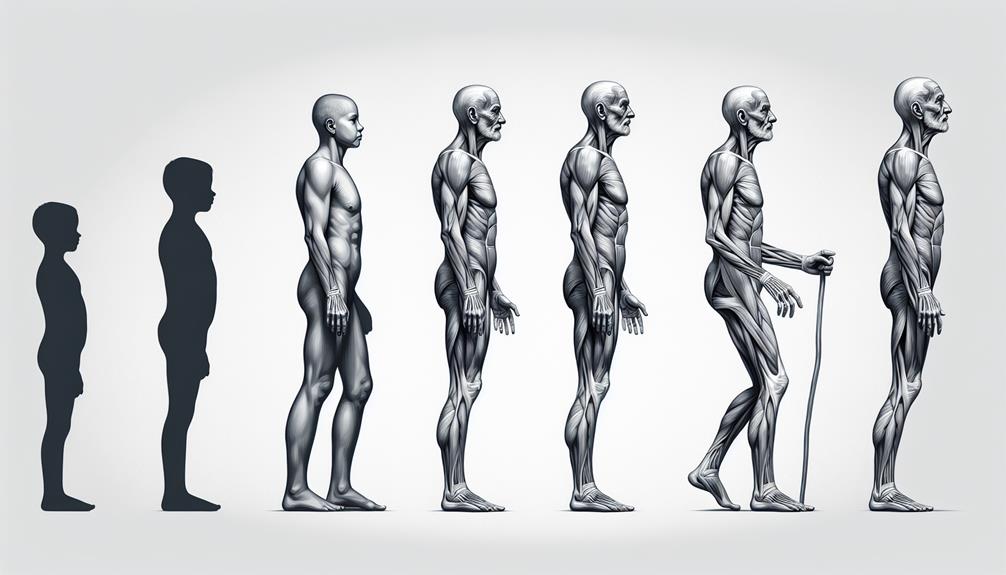
As you age, your metabolism changes, affecting muscle mass and hormones. Adapt by choosing nutritious foods and doing strength exercises. Seniors need protein for muscle health and weight management. Stay hydrated to prevent health issues and maintain electrolyte balance. Include vitamins like D, B12, C, and K for immunity, nerve function, and bone health. Gut health is crucial, so eat probiotics and enzymes. Support bone health with calcium and vitamin D. Boost brain health with omega-3s and antioxidants. Adjust taste preferences with spices and textures. Understanding these insights is key for your optimal health and well-being.
Key Takeaways
- Metabolism changes with age, impacting nutrient requirements.
- Adequate protein intake is crucial for muscle health.
- Hydration is essential for health and cognitive function.
- Key vitamins like D, B12, C, and K are vital.
- Gut health and digestive enzymes influence nutrient absorption.
Aging and Metabolism Changes
As you age, your metabolism undergoes changes that can impact your nutritional needs and overall health. These age-related changes can lead to fluctuations in your metabolism, affecting how efficiently your body processes nutrients and burns calories.
One significant change is the decrease in muscle mass, which can occur as you get older. Since muscles play a key role in burning calories, a reduction in muscle mass can slow down your metabolism. Additionally, hormonal fluctuations, such as a decrease in estrogen or testosterone levels, can also influence how your body metabolizes food.
To adapt to these metabolism changes, it's essential to make adjustments to your diet and lifestyle. Choosing nutrient-dense foods that are rich in vitamins, minerals, and protein can support your metabolism and overall health. Regular physical activity, especially strength training exercises, can help preserve muscle mass and boost your metabolism.
Protein Requirements for Seniors
With aging, maintaining adequate protein intake becomes increasingly important to support muscle health and overall well-being. As you age, your body's ability to maintain muscle mass decreases, leading to sarcopenia, a condition characterized by muscle loss. Consuming sufficient protein is crucial for muscle maintenance in seniors. Protein provides essential amino acids necessary for muscle repair and growth, helping to counteract the natural decline in muscle mass that comes with aging.
Additionally, protein plays a key role in regulating satiety levels, helping you feel full and satisfied after meals. This can be particularly beneficial for older adults who may struggle with appetite and unintentional weight loss. Including protein-rich foods like lean meats, poultry, fish, eggs, dairy, legumes, nuts, and seeds in your diet can support muscle health, aid in weight management, and contribute to overall well-being as you age.

Importance of Hydration in Aging
Staying properly hydrated is essential for maintaining optimal health and well-being as you age. As you grow older, your body's ability to retain water diminishes, making it crucial to pay close attention to your hydration balance. Dehydration can lead to a range of health issues, including urinary tract infections, constipation, and even cognitive impairment. Ensuring that you drink an adequate amount of water throughout the day is key to supporting your overall health.
In addition to water intake, electrolyte balance is also vital for older adults. Electrolytes are minerals like sodium, potassium, and magnesium that play a crucial role in maintaining proper fluid balance, nerve function, and muscle contractions. As you age, your body's electrolyte levels can become imbalanced more easily, especially if you have certain health conditions or take medications that affect electrolyte levels. Consuming electrolyte-rich foods such as bananas, leafy greens, and nuts can help support your body's electrolyte needs and overall hydration status. Remember, staying hydrated and maintaining electrolyte balance are essential components of healthy aging.
Key Vitamins for Older Adults
Ensuring that older adults meet their key vitamin requirements is crucial for supporting overall health and well-being during the aging process. Vitamin deficiencies can have a significant impact on older adults due to changes in metabolism and reduced nutrient absorption. Here are some key vitamins that older adults should focus on incorporating into their diet:
| Vitamin | Function | Food Sources |
|---|---|---|
| Vitamin D | Supports bone health and immune system | Fatty fish, fortified dairy |
| Vitamin B12 | Essential for nerve function | Meat, fish, dairy products |
| Vitamin C | Important for skin health and immunity | Citrus fruits, bell peppers |
| Vitamin K | Aids in blood clotting and bone health | Leafy greens, broccoli |
Older adults are at a higher risk of vitamin deficiencies due to factors such as decreased food intake and changes in the digestive system affecting nutrient absorption. Therefore, it is essential to consume a balanced diet rich in these key vitamins to maintain optimal health and well-being as you age.
Managing Digestive Health in Aging
Maintaining digestive health becomes increasingly crucial as individuals age, with factors such as decreased food intake and changes in the digestive system impacting nutrient absorption. The gut microbiota, a diverse community of microorganisms residing in the gastrointestinal tract, plays a vital role in digestion and overall health. As you age, maintaining a healthy balance of gut bacteria becomes essential for proper nutrient absorption and immune function.
Another key aspect of managing digestive health is the production of digestive enzymes. These enzymes, such as amylase, protease, and lipase, help break down carbohydrates, proteins, and fats, respectively. However, aging can lead to a decline in the production of these enzymes, affecting the body's ability to efficiently digest food and extract essential nutrients.

To support your digestive health as you age, consider incorporating probiotic-rich foods like yogurt and kefir to promote a healthy gut microbiota. Additionally, including enzyme-rich foods such as pineapple and papaya in your diet can aid in the digestion process. Prioritizing these aspects can help you maintain optimal digestive health as you grow older.
Nutritional Strategies for Bone Health
As you focus on optimizing your nutritional intake for bone health, incorporating specific nutrients and dietary choices can play a significant role in supporting and maintaining strong bones as you age.
To enhance your bone health, consider the following strategies:
- Calcium Supplements: Calcium is crucial for bone strength. If you struggle to meet your calcium needs through diet alone, talk to your healthcare provider about calcium supplements to ensure you're getting an adequate intake.
- Vitamin D Sources: Vitamin D is essential for calcium absorption and bone health. Include sources of vitamin D in your diet such as fatty fish, fortified dairy products, and spending time in the sun. If needed, your doctor might recommend vitamin D supplements.
- Balanced Diet: A well-rounded diet rich in fruits, vegetables, whole grains, lean proteins, and healthy fats provides the necessary nutrients for overall bone health. Aim for variety to ensure you're getting all the essential vitamins and minerals needed for strong bones.
Dietary Considerations for Cognitive Function
To support optimal cognitive function, incorporating specific nutrients and dietary choices into your daily meals can significantly impact brain health as you age. Maintaining brain health is crucial for memory maintenance and overall cognitive abilities. Certain nutrients play a key role in supporting brain function. Here are some essential nutrients and dietary choices that can benefit your cognitive function:
| Nutrient | Food Sources | Benefits |
|---|---|---|
| Omega-3 fatty acids | Fatty fish (salmon, mackerel), flaxseeds, walnuts | Enhances brain structure and function, supports memory |
| Antioxidants | Berries (blueberries, strawberries), nuts, dark chocolate | Protects brain cells from damage, improves memory |
| Vitamin E | Almonds, sunflower seeds, spinach | Acts as an antioxidant, supports cognitive function |
| B Vitamins | Whole grains, eggs, dairy products | Essential for brain health and cognitive processes |
| Curcumin | Turmeric | Anti-inflammatory properties, may improve memory function |
Incorporating these nutrients into your diet can contribute to better brain health and memory maintenance as you age. Remember, a well-balanced diet rich in these nutrients is key to nurturing your cognitive function.
Adapting to Changing Taste Preferences
Adapting your dietary choices to accommodate changing taste preferences is important as you age, ensuring you continue to consume essential nutrients for optimal cognitive function. As you grow older, your flavor preferences may shift due to taste bud changes, influencing the foods you enjoy.

To adapt successfully:
- Experiment with Herbs and Spices: Enhancing the flavor of meals with herbs and spices can make them more appealing as taste buds become less sensitive. Try adding fresh herbs like basil, cilantro, or mint to elevate the taste of dishes without relying on salt or sugar.
- Incorporate Texture Variety: Changes in taste preferences can be influenced by the texture of foods. Including a variety of textures, such as crunchy nuts, creamy avocados, or chewy whole grains, can make your meals more satisfying and enjoyable.
- Gradual Changes in Recipes: If you find that your taste preferences are evolving, consider gradually adjusting your recipes to accommodate these changes. This could involve reducing sweetness, increasing savory elements, or exploring new flavor combinations to keep your meals exciting and nutritious.
Conclusion
As we journey through the golden years of life, nourishing our bodies with the right nutrients becomes crucial for maintaining health and vitality.
Imagine a symphony of flavors and textures dancing on your taste buds, supporting your bones, cognitive function, and digestive health.
Embrace the power of protein, hydration, vitamins, and mindful eating to savor every bite of this beautiful chapter of life.
Let nutrition be your partner in aging gracefully and vibrantly.



